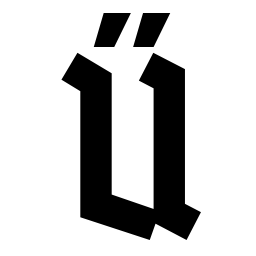C++ header converter¶
C++ header converter is a tool, which allows to generate Ü bindings for C or C++ header files. C headers are fully supported, but only limited subset of C++ headers may be converted. This tool is designed for simplification of C and Ü code interaction. The output file, produced by it, may be imported directly in Ü code or it may be manually tweaked first, if it’s necessary.
C++ header converter is based on clang source code and thus can parse any valid C header properly, exactly like real C compilers do this. So, there is no problem of mis-parsing some headers, what often happens with some hand-written C parsers.
Possibilities and limitations¶
C++ header converter can create prototypes for functions, it can convert structs, enums, typedefs, some constant variables. But there are still a lot of limitations caused by differences between C and Ü:
Most functions are translated properly as
nomanglefunctions withCcalling convention.Functions with names matching an Ü keyword are ignored - they can’t be used. Also functions starting with
_are ignored, since in Ü identifiers can’t start with_.Functions with variadic arguments in Ü aren’t supported, C variadic functions become non-variadic in Ü.
C built-in types are mapped to Ü types (where it’s possible).
Structs are translated properly as Ü structs with
orderedmarker.C unions and structs with bit-fields are translated as structs with single field - array of
byte-type elements, so that this struct matches original union/struct size and alignment. It’s done in this way, since Ü has no unions and bit-fields.Incomplete types are translated as empty classes with disabled default constructor, since Ü has no incomplete types.
Both
constand non-constpointers are translated as raw pointers in Ü, which are always assumed to be mutable (non-const).Enums are always translated as their underlying types, enum members are translated as global constant variables.
Anonymous structs and enums are translated with a generated name given, since in Ü there are no anonymous structs and enums.
Typedefs are translated as Ü type aliases, including typedefs combined with struct/enum declarations.
Names except function names may be renamed, if a name can’t be valid Ü name or in case of name conflicts.
Nested structs are moved into the global namespace (for simplicity), possible with renaming to avoid name conflicts.
Global variables are translated, but only if they are
constand have compile-time initializer. Variables of scalar types are supported. Arrays are supported too, but only with number of initializers matching array size. Struct/union types aren’t supported.Simple defines containing integer, char or string literals are translated as global constants. More complex defines are ignored, even defines for negative numbers.
Possibilities and limitations for conversion of C++ headers:
Only
extern "C"functions are supported, with argument types/return types compatible with C.Non-templated
usingdefinitions are translated properly as type aliases.Classes are translated as structs, visibility labels and member functions are ignored.
Polymorph classes/classes with inheritance aren’t handled properly.
Scoped enums are translated as type alias for their underlying integer type. A namespace with
_suffix is created for members of such enums.Namespaces aren’t supported, they will likely break the tool.
No templates are supported, they will likely break the tool.
Command-line interface¶
Basic usage is following:
u.._cpp_header_converter some_c_header.h -o some_c_header_converted.uh -- -std=c11
Input file(s) are specified directly.
Available command-line options:
-o - specify output file.
--force-import - create an import statement inside output file, importing file specified.
--skip-declarations-from-includes - skip converting declarations from includes.
Additionally C or C++ options may be specified after --.
Since C++ header converter is based on clang, many clang options are supported, see its documentation for more details.
The most common of these options, that are used in C++ header converter, are standard options (-std=c11, -std=c++17, etc.) and include directories option (-I).
Usually C++ header converter is shipped together with clang internal headers, which are located in directory like lib/clang/17/include of the Ü installation.
This directory is automatically added into include search paths.
But if this is not the case, the path to this directory should be specified manually via -I option.
--force-import and --skip-declarations-from-includes options may be used in combination, if one want to convert each header file of a complex include hierarchy separately and recreate such hierarchy of Ü imports.
